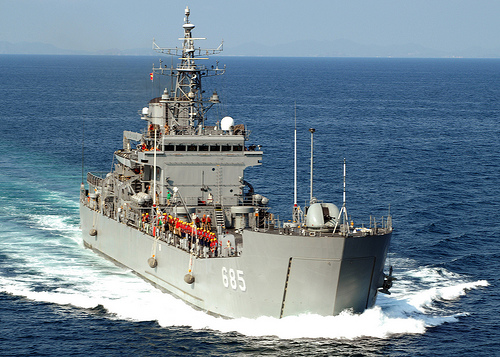Pyongyang then proposed a peace agreement to the United States for the first time in 1974. North Korea again proposed a peace agreement to the United States in 1993. It then conducted armed demonstrations several times in Panmunjom between 1994 and 1996, and provoked an exchange of fire in the DMZ in 1997. They also conducted naval actions to challenge the NLL in the Yellow Sea in 1999, which developed into a major exchange of gunfire between the two Koreas.
In each case, the North Koreans contended that military tension was rising and the danger of war was looming large on the Korean Peninsula; and in order to avoid another war, the United States and North Korea must conclude a peace agreement and establish a new peace mechanism. North Korea just proposed talks to replace the Armistice Agreement with a peace treaty in January. The sinking of Cheonan seems to fit North Korea’s past behavior.
Second, North Korea wanted to pressure South Korea to readopt the more accommodative sunshine policy. Since the conservative President Lee Myung-bak came to office, he has pledged to proactively engage with the North but on the principle of reciprocity. In fact, the two Koreas almost agreed to hold a summit meeting last year but failed to do so partly because the South Korean government refused to make unilateral concessions to Pyongyang’s demand. Although South Koreans seem to be united in mourning the deceased sailors of the Cheonan, there is debate over whether it is a good idea to apply strict reciprocity to inter-Korean relations. South Korean liberals argue that more proactively engaging with the North would produce better results with peaceful North-South relations, an improved humanitarian situation in the North, and a better environment for the ultimate objective of unification. Given the upcoming local elections in June, President Lee must strike a good balance between addressing the issue of who is responsible for the Cheonan incident and maintaining stable inter-Korean relations.
Finally, North Korea wanted to drive a wedge between the United States and South Korea. They have got tough with the South; it is the time for them to get soft with the United States. North Koreans are versed in brinkmanship. They go close to the brink but know how to come back from it. If North Korea sank Cheonan, the attack must have been an integral part of a broader military-diplomatic campaign vis-à-vis its major interlocutors, particularly the United States. Kim Jong Il’s visit to China strongly suggests that that North Korea will make concessions on some of its previous demands. Such concessions would indicate that reconvening the Six-Party Talks or holding preliminary talks will become realistic again. At the moment, South Korea is not in the mood for talks with the North, and its US allies share the feeling. However, if no compelling evidence that North Korea has sunk Cheonan is obtained and North Korea makes some meaningful concessions, the United States might ask a reluctant South Korea to participate in an earlier than expected resumption of the Six-Party Talks, treating the sinking of the Cheonan and denuclearisation issue separately.
Narushige Michishita is Associate Professor in the Security and International Studies Program at the National Graduate Institute for Policy Studies (GRIPS) in Tokyo, and is the author of ‘North Korea’s Military-Diplomatic Campaigns, 1966-2008’ (Routledge, 2009).
This article is part of a special feature on the aftermath of the Cheonan sinking.

